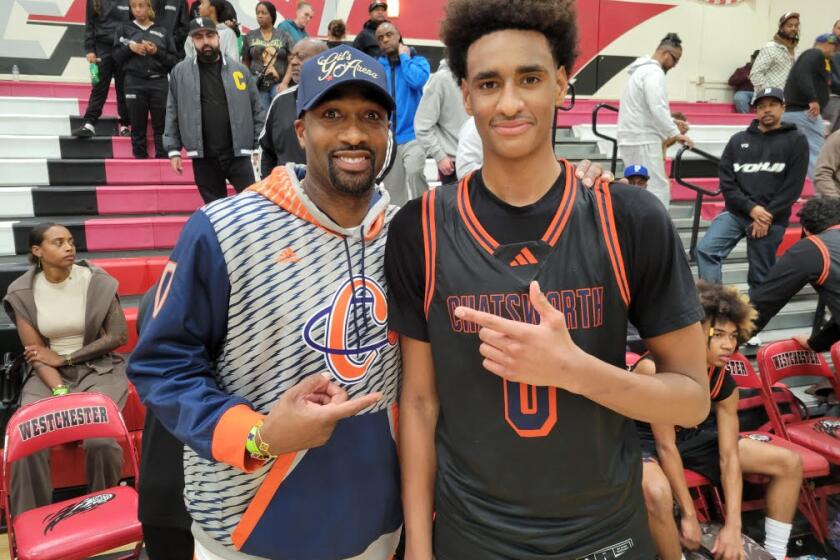Green No Longer Just Running Around in Bad Circles : Track: Once a troubled young man, he has put his life back on track through both football and track. His performance at the Junior Pan American Games is one example.
SAN DIEGO — At first they annoyed her, then they worried her. Barbara Green-Shelton didn’t think much of the circle of friends her son kept at the start of his junior year at San Diego High.
“He didn’t like to bring them around,” she said of Keith Green’s new-found friends. “So there were a lot of phone calls. It was like a secret society. I could tell they were arrogant, belligerent . . .”
And trouble.
Green, now a 19-year-old, two-sport athlete at San Diego City College, served time as a result of a one-night crime rampage Oct. 21, 1989, when he and a group of friends--a term he used loosely--including five San Diego High football buddies, robbed victims at gunpoint at various locations in Mission Beach.
His 14-month incarceration included 10 in juvenile hall because he was still younger than 18, then he was transfered to the California Youth Authority in Norwalk, before he was released from the county jail in Vista on Dec. 13, 1990.
“When I got that infamous phone call,” Green-Shelton said of the call she received informing her that her son had been arrested, “I thought it was a case of mistaken identity. I was in total denial. My reaction was, ‘You can’t possibly have that dimpled darling I brought into this world.’ ”
The path that dimpled darling is now on is one that Green-Shelton had envisioned all along. Green is a student again, this time at SDCC, where he is a wide receiver for the Knights and where he will run his second junior college track season this winter. His first season was so good that he qualified for the Junior Pan Am games in Kingston, Jamaica, and he unexpectedly won gold medals in the 100 meters and the 400-meter relay.
Richard Ugale, an assistant SDCC track coach, and Martin Moss, the football coach, feel that each of their sports holds a promising future for Green.
“He’s not a track guy who turned into a football player,” Moss said. “He’s a football player who can run track. He’s played the game, he knows the game, and he’s very skilled.”
Said Ugale: “You take stock of your success in whatever sport you’re in. Your stock rises as a track athlete when you run a 10.29 in the 100. He doesn’t really know what the 10.29 means, until coaches start talking to him. He doesn’t know how good an athlete he is.”
Green’s speed is a bit deceiving. The qualifying time for the Olympic trials in New Orleans next summer in the 100 is 10.23; the provisional mark is 10.32. Green’s 10.29 in Jamaica was wind-aided, but Ugale said his vast improvement over one season--considering his meager background--is reason to contemplate a future in track.
“It’s amazing to me what’s he’s done after two years of being off and almost no track experience at all,” Ugale said.
Green is flattered his talent is being tapped by more than one source, but he isn’t sure which sport is tugging harder at his heartstrings. It all comes down to which can take him further.
“My main interest was always football,” Green said. “Track was just something I liked to do, cause I was always fast growing up. That’s a tough (question). I never really thought about the Olympics before. But a scholarship is probably more important right now. I have to take school seriously. What happens if I’m not fast anymore and I still don’t have an education?”
Ugale said Green has several options. He could mix his track and football prowess and aim for a scholarship to pay for the rest of his college education, or he could concentrate exclusively on track, in which an Olympic berth is possible and an international career appears feasible.
“I would like to see him extend his education beyond city college,” he said. “He could probably combine the two (sports) for a scholarship, but he definitely has an international career ahead of him and he could be touring Europe next year.”
Ultimately, the decision is up to Green. “Invariably, (athletes) go out and play what they want,” Ugale said.
Either way, his track talents remain largely untapped. Green is so new to track and field that City’s track staff is still trying to pinpoint his strengths.
“His range could be the 100 to the 400, and he many try some long jumping next year,” said Ugale. “He could even be a pretty good decathlete. He’s diverse enough to be a multisport athlete. If you just look at the sprints, you’re looking at events where the United States dominates so much,” so it would behoove Green to branch out.
“The 200 could be his best event. We’re just not sure what his range is. Most of the people who are champions start much younger. He still has so little experience,” he said.
During the days Green could have spent training, he was dabbling in some dangerous business. What Green called a case of boredom careened so out of control that Green wound up facing 26 charges, his mother said. After plea bargaining, he was charged with three counts of armed robbery.
Green-Shelton wondered where she went wrong and initially took the blame for her youngest child’s failings.
“He wasn’t raised to have a low value of life,” she said. “We put a premium on life and good values, that you work hard, go to college and do something with your life. You think, ‘Gee, did I drop him on his head?’ You go back to your own values. What should I have said or done? Most parents want to take the blame, but it’s not justified. He didn’t have to do those things.”
At the time he was to be sentenced, Green already had spent 14 months in jail, a period he could have been out on bail. Talk about tough love. Green-Shelton chose not to get him out, a decision she said wasn’t popular with her other children or her mother.
“I allowed him to stay there instead of getting out of bail,” said Green-Shelton, who works for the campus police at SDCC. “I opted for him to chill out in there.”
At his sentencing, the judge, instead of locking him up for another 18 months, called Green a “passive participant,” and said he already had served the time they would have given him.
“I wanted him to take full responsibility,” Green-Shelton said. “I wanted him to pay for what he did, but not for what he didn’t do. With 14 months in jail, he already paid for being a passive participant.”
Said Green: “The judge said it was the hardest decision he’s had to make. Whether to let me go home or send me back for 18 months. He gave me a chance.”
And Green, who said he never even held a gun during that October night, intends to take advantage of it. He takes full responsibility for what he did, but Green blames hanging out with a bad crowd and peer pressure for his fast fall.
“I didn’t use good judgment,” he said. “If I had just listened to my teachers and coaches, I could have avoided it all. Some of those people, I knew they were capable of doing something like that.”
Green would someday like to talk to young athletes who might find them in similar situations and try to deter them.
“Crime doesn’t pay, it sure doesn’t. That’s what I’d tell them,” Green said. “It may be the easy or cool thing at the time, but hard work pays off. Taking (money) from someone is the stupid way out.”
The healing process for Green and his family is a joint process--and one that takes time.
“At first, I thought my life was over,” he said. “I wasted myself. I could have gotten a scholarship. It’s helped me respect people and their property more. I thought about how I would feel if I was being robbed.”
Lousy.
And it took Green-Shelton a while to get over her own ill feelings.
“You have to get over your feeling of anger and disillusionment,” she said. “He had a chance to see what it was like on the inside and it wasn’t what he thought it would be . . . Your freedom’s more important than Air Jordans or peer pressure. People locked up are only free in their mind.”
More to Read
Get our high school sports newsletter
Prep Rally is devoted to the SoCal high school sports experience, bringing you scores, stories and a behind-the-scenes look at what makes prep sports so popular.
You may occasionally receive promotional content from the Los Angeles Times.






